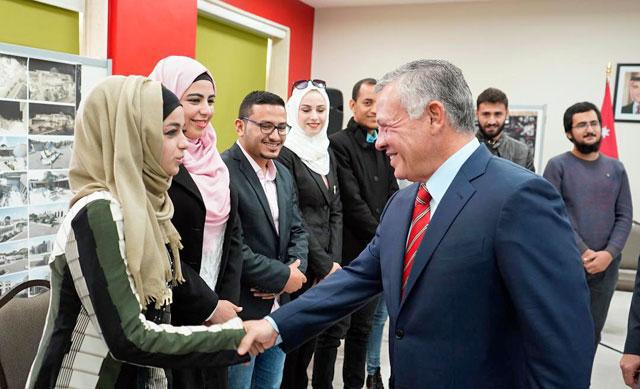You are here
Youth ‘optimistic’ after King’s remarks on ‘potential of new blood’
By Renad Aljadid - Jun 08,2018 - Last updated at Jun 08,2018

Two young protesters carry Jordanian flags during a protest near the Prime Ministry in Amman, on Wednesday (AFP photo)
AMMAN — Jordanian youth voiced optimism following His Majesty King Abdullah’s latest remarks in which he called for “opening the way to new blood and youth with potential to serve their country” and expressed hopes to see the Royal vision translated into reality.
“We are very proud that the Royal vision gives the youth trust and freedom to express themselves and share their concerns and opinions at a time when the youth minister himself was not a youngster,” activist and blogger Noor Abu Goush told The Jordan Times on Thursday, adding “we hope the time has come when the youth can finally have a visible presence in the government, the Parliament, and the decision-making process in general.”
Mohammad Qasem, a 28-year-old activist and one of the instigators of the Fourth Circle area campaign, said: “The majority of the Jordanian society is from the younger generation, yet, the leadership positions are dominated by older individuals, whose decision-making approach is based on unilateralism.”
“It is necessary that the new government members are chosen based on their competence, not on considerations like age, geography, or tribalism ,” Qasem told The Jordan Times, stressing the necessity for the new prime minister’s reply “to be announced as soon as possible in order to cool-off the fired street movements”.
For 26-year-old lawyer Reem Sanna, “our country needs both the wisdom and experience of the older generation and the enthusiasm and creativity of the youth. Jordan would enjoy a great and balanced system if we achieved cooperation between the two parties, where the youth rush is channelled and the old intransigence is softened.”
The activists agreed that the younger generation has “great potentials” and “impressive capabilities”, but these should be directed wisely and invested in the right place.
“Perhaps not all youth are aware enough, so we need to raise their awareness, give them freedom of expression, and put an end to the muzzling approach that many universities and educational institutions are exercising,” Qasem noted, stressing “the change starts from the very early stages of schools, where not only school books should be changed but even the teaching mechanisms and the relationship between students and educators should be tilted towards open dialogue and shared discussions.”
President of the Centre for Strategic Studies at the University of Jordan (UJ) Musa Shteiwi, who is also a sociology professor, noted: “The enforced and dominating political culture, which gives huge considerations to age and experience and less attention to the young voices, is placing an obstacle towards the youth involvement in leadership positions.”
He said that the King sent the new government a “clear and powerful” message, which recognises the voices of the youth, their ideas, opinions, and concerns.
“Involving the youth in the government is only one part, as they should also be involved in various aspects of life as well as public dialogue,” Shteiwi said, highlighting “involving the youth gives them hope that they will have an effective role, encouraging them to work harder.”
Abdullah Dalaen, a member of the “SHABAB 2250” project, said that the youth movement in the country is “changing”.
“I admit that I used to exercise a barbaric behaviour when expressing my opinions, but now, I have learnt how we should all be one and mobilise our efforts towards a joint goal that we want to achieve, through a peaceful and civilised approach,” Dalaen explained.
SHABAB 2250 is related to the UN Security Council’s adoption of the resolution 2250 on youth, peace and security, which was adopted in December 2015 following HRH Crown Prince Hussein’s speech as the chair of the UN Security Council meeting in 2015.
The recent street movements, which were mainly dominated by the Jordanian youth, are “a good indicator for national unity and the youth’s love for their country”, said Majd Sarsak, president of the UJ students’ union, who said “we want a government that can feel its citizens and stand by their side, and this can be achieved through the inclusion of all segments of society in a national dialogue that meets citizens’ demands and not only collects money from their
pockets.”
Related Articles
AMMAN — The concluding conference of the “SHABAB 2250” project related to the UN Security Council’s adoption of the resolution 2250 on youth
AMMAN (JT) — On the first anniversary of UN Security Council Resolution 2250 on Youth, Peace and Security, adopted on December 9, 2015, Gene
AMMAN — In a country with a considerably young population, His Majesty King Abdullah has put a lot of emphasis on the youth-focused policies

















